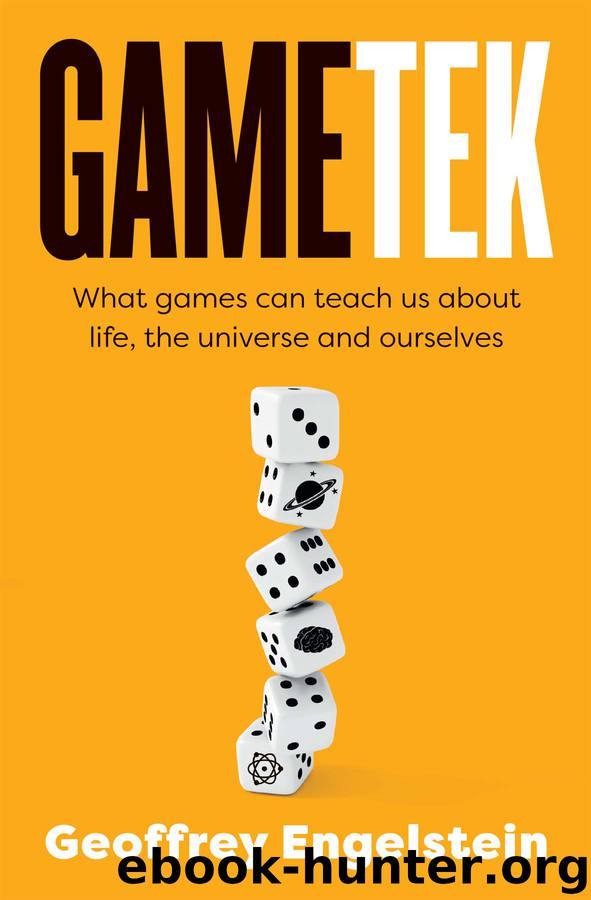GameTek by Geoffrey Engelstein

Author:Geoffrey Engelstein
Language: eng
Format: epub
Publisher: HarperCollins
Published: 2018-12-20T16:00:00+00:00
Ratings and Regression toward the Mean
We play board games for a variety of reasons – social interaction, intellectual challenge, exploring innovative mechanics, or learning about a new topic. But let’s face it – all of us, at least once in a while, like to win.
So, we play, and sometimes we win, and sometimes we lose. Now, let’s say you sit down to play a game and you have one of those magical performances. You understand exactly what’s going on. You can predict what your opponents are going to do. Your strategies unfold precisely according to plan.
We’ve all been there. We’ve all been in that zone.
But then you play the next time, and, unlike your previous commanding performance, you just can’t seem to get ahead of the curve. You’re back in the middle of the pack.
Well, this happens a lot. At least to me.
So, what’s going on?
Nobel Prize-winning psychologist Daniel Kahneman tells an illuminating story in his 1982 book, Judgment Under Uncertainty. While attending a Navy conference, he spoke with naval flight instructors about whether they thought that praise or criticism was a better motivating tool. And almost universally they picked criticism.
One instructor put it this way: ‘If a student has a good landing and I praise them, they usually do worse next time. But if they do poorly and I yell? They always improve on their next landing.’
This is a classic example of what is called ‘regression toward the mean’. In a nutshell, if you do poorly one time, you will most likely do better the next. And if you do well, you will most likely do poorly next.
Assume that your performance at an activity – whether it’s landing airplanes, bowling or playing Primordial Soup – is shaped like a bell curve. Most of the time, you have an average performance, with a lesser chance of being better or worse. Note that this average is for the way you personally perform. If your average at ten-pin bowling is 120, sometimes you may bowl a 140, and sometimes a 100. But obviously someone else will have a different average.
Now, in our bowling example, if you bowl that 140, you may feel pretty good about yourself. You may think that your skills are finally improving and that you’re ‘in the groove’. However, from a purely statistical standpoint, it is much more likely that your average is still around 120. So, when you bowl again, there is much more of a chance of bowling lower than 140 than higher. Now, this can work both ways: if you bowl lousy, you’ll be more likely to do better next time.
In both cases, you will tend to drift back (or ‘regress’) toward your average (or ‘mean’). Hence the term ‘regression toward the mean’. But this isn’t the only factor at play when it comes to determining skill level.
In 1999, two psychologists from Cornell University, David Dunning and Justin Kruger, did a series of studies to measure how skilled people thought they were.1 They gave people tests in three different areas: logic, grammar and humour.
Download
This site does not store any files on its server. We only index and link to content provided by other sites. Please contact the content providers to delete copyright contents if any and email us, we'll remove relevant links or contents immediately.
| Backgammon | Checkers |
| Scrabble |
Harry Potter and the Cursed Child: The Journey by Harry Potter Theatrical Productions(3992)
The Sports Rules Book by Human Kinetics(3602)
Molly's Game: From Hollywood's Elite to Wall Street's Billionaire Boys Club, My High-Stakes Adventure in the World of Underground Poker by Molly Bloom(2977)
A Knight of the Seven Kingdoms by George R R Martin(2638)
Quidditch Through the Ages by J.K. Rowling(2615)
Quidditch Through the Ages by J K Rowling & Kennilworthy Whisp(2590)
How To by Randall Munroe(2500)
Quidditch Through the Ages by Kennilworthy Whisp by J.K. Rowling(2456)
Quidditch through the Ages by J. K. Rowling(2387)
Quidditch Through The Ages by J. K. Rowling(2347)
The Infinite Retina by Robert Scoble Irena Cronin(2287)
Stacked Decks by The Rotenberg Collection(2285)
776 Stupidest Things Ever Said by Ross Petras(2282)
What If?: Serious Scientific Answers to Absurd Hypothetical Questions by Randall Munroe(2179)
Flowers For Algernon by Daniel Keyes(2172)
Beautiful Oblivion by Jamie McGuire(2157)
The Book of Questions: Revised and Updated by Gregory Stock Ph.d(2146)
Ready Player One: A Novel by Ernest Cline(2084)
Champions of Illusion by Susana Martinez-Conde & Stephen Macknik(2081)
